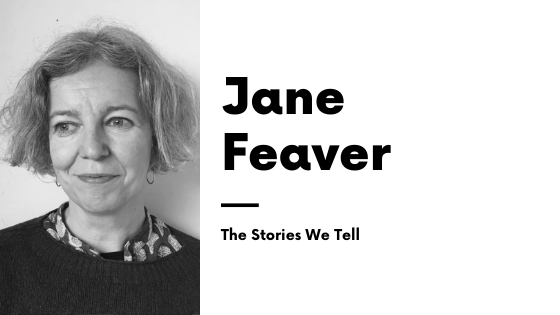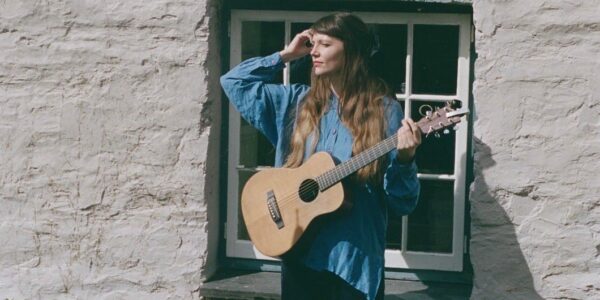Jane Feaver – The Stories We Tell
03 Nov 2021 / The Stories We Tell

‘I’: 26 reflections on the fiction of self
Mæg ic be me sylfum soðgied wrecan
‘May I for my own self song’s truth reckon’ –Ezra Pound’s translation of ‘The Seafarer’ from the Anglo-Saxon.
I. I will put ‘I’ in inverted commas, as if with tongs or a pair of tweezers we could pick it up, examine it. A single stroke, it is the simplest and – if inadvertently – the first letter we are likely to form. We learn to write it properly in a way that makes it indistinguishable from the number one, which is also recognizably a singular thing.
II. In our first stabs at drawing, this upright figure has the capacity to be the trunk of a man, a woman, a child, a tree, a cognitive leap towards the magic of representation that is key to our ability to differentiate ourselves as both subjects and objects in a world that is in a constant state of flux.
III. Our first fiction is our self. In memoir, autobiography, autofiction – literary manifestations that can be traced back to the earliest records – there is no getting away from the ‘I’. It is the staff by which we launch ourselves into story; it punctuates the narrative like fence posts in snow, which, for want of another guide, a reader will choose (or not) to follow.
IV. ‘I’: to say so is to state a case, to summon up evidence, body and soul, and, so-armed, to intrude oneself upon the page.
V. In 1789, Rousseau introducing The Confessions, told us that his purpose was to present a man ‘dans toute la verité de la nature’/in all the truth of nature, by which he meant warts and all. It would be a unique undertaking because he could confidently claim that he, Rousseau, was like no one else in the world: ‘Si je ne vaux pas mieux, au moins je suis autre.’/if I’m worth no better, at least I am other. Across the Channel, in 1797, Coleridge was writing to his friend Mr Poole: ‘I could inform the dullest author how he might write an interesting book. Let him relate the events of his own life with honesty, not disguising the feelings that accompanied them.’
VI. Honesty is far easier said than done. The Anglo-Saxon seafarer begins his song with a claim to truth: soðgied, translating literally as ‘true song’ or tale. By my troth. And on one hand, hearing a story from the horse’s mouth, we are predisposed to credit it. But questions of veracity dog the ‘I’, because – as we soon learn – the I can be as duplicitous as the next person. To write with any truth on the subject demands a certain level of self-knowledge and awareness. Even if the intention is to be truthful (which it isn’t always), the self is the greatest deluder of them all. Mirror, mirror…
VII. George Orwell wonders whether the demon urge to write is no more than the ‘instinct that makes a baby squall for attention’. The same urge that drives us to score our names into desks, a proof that we were here. ‘And yet,’ Orwell says (and here is the rub), ‘it is also true that one can write nothing readable unless one constantly struggles to efface one’s own personality.’ To be clear, he says: ‘Good prose is like a window pane.’
VIII. In 1962, Sylvia Plath who was making a name for herself among so-called ‘confessional’ poets decries ‘these cries from the heart that are informed by nothing except… a needle or a knife.’ What the writing requires is an ‘informed and intelligent mind’, one that is able to manipulate and control the experience. She says, ‘I think that personal experience is very important, but certainly it shouldn’t be a kind of shut box and sort of mirror-looking, narcissistic experience.’
IX. There is no doubt that the repetitions of the ‘I’ can become tiresome both to look at and to hear. Formed in the back of the throat, ‘I’ is indistinguishable from the ‘ai’ that is a response to pain or slight; once we are attuned, it can be a caterwaul, to which instinctively we block our ears.
X. ‘Never write in the first person.’ This was the first formal writing injunction I received, reflecting, though not addressing, the pitfalls of writing in this mode. Such narratives can have all the charm of a pub boor who transmits without taking breath or the time to pay attention to anything or anybody else. Barry Hannah, also a teacher of writing, was more canny: ‘First person is where you can be more interesting as a fool, and I find this often leads to the more delightful expedition. You don’t have to be much but a stumbling fool. The wisdom there is more precious than in the sage overview, which in many writers makes me nearly puke.’
XI. With my looks I am bound to look simple, says the ‘I’ in Stevie Smith’s poem ‘Magna Est Veritas’. The ‘I’ is not half as simple as it looks, but a conundrum: ‘I’ represents an individual thing, unique in its individual composition, and yet it can and does stand just as precisely for any number of unique individual beings. Every one of us is wholeheartedly capable of identifying with the specificity of that ‘I’; it can stand for you and, at the very same time, it can stand for me; and more, it offers, irresistibly, other identities, which, like clothes from the dressing-up box, we can slip into. Transparency (see Orwell, 8) is a capacity to put ourselves in the place of another.
XII. In the middle of the poem, ‘Song of Myself, 51’, Walt Whitman asks,
Do I contradict myself?
Very well then I contradict myself,
(I am large, I contain multitudes.)
The ‘I’, which we had thought indivisible and unique, is suddenly revealed to be multifarious, and infinitely so. It is a sliding door, a two-way mirror, a facility that concedes the co-existence of individuality and multiplicity, an endless flexibility, allowing us to be wholly visible as well as wholly invisible.
XIII. In a lecture entitled ‘Women as Writers’, Sylvia Townsend Warner extols the virtue of invisibility and in particular women’s talent for ‘vanishing out of their writing.’ This talent she sees as a prerequisite for that quality she most admires: ‘immediacy’, ‘a queer brilliant verisimilitude’, particularly evident in writing that is attentive to and in the moment. Historically, she argues, women have been more straightforward and pragmatic about what they write, unlike men who are ‘weighed down’ with ‘heavier equipment of learning and self-consciousness.’ In order to vanish, the writer needs to excise his or her writerly commentary, the ‘chaperoning hand’. Women are not immune. George Eliot, as Warner points out, provides a case in point: when Eliot dissects a heart, for instance, ‘something intervenes between us and the demonstration – the lecturer’s little wand.’
XIV. How wilt thou say to thy brother, Let me pull out the mote out of thine eye; and, behold, a beam is in thine own eye? Matthew 7:4. For beam, read ‘plank’, read ‘lecturer’s little wand’. The self as skelf, a splinter lodged in the skin. Is it any coincidence that these irritants are all ‘I’ shaped? Sort yourself out, Matthew is saying, and the first step in doing so is to recognize the limitations of that ‘I’, to name it for who and what it is.
XV. In an authorial note attached to Goodbye to Berlin, Isherwood tells us that just because he uses his own name, we shouldn’t take what follows as ‘purely autobiographical’. “Christopher Isherwood” he says is ‘a convenient ventriloquist’s dummy’, an abstraction from that Christopher Isherwood who otherwise passes undefined and undefinable in the world. He has made a tool of himself, an object as capable of manipulation and manoeuvring as any other aspect of the text. In the very first section of the book, ‘A Berlin Diary’ we discover his modus operandi: ‘I am a camera with its shutter open, quite passive, recording, not thinking.’ The ‘I’ is a mechanical ‘eye’, an eye that faithfully records, but doesn’t think, doesn’t pass judgement or comment, doesn’t ‘feel’.
XVI. The reader needs space. ‘Some day,’ Isherwood tells us, the stuff that he observes through his camera eye ‘will have to be developed, carefully printed, fixed.’ This some-day-process is in effect the reader’s job; a brilliantly effective way of drawing her in, making her complicit.
XVII. ‘Fiction’ comes from the Latin, to fashion or form. It describes most comprehensively all those things we make, but it is no coincidence that the artform it is most associated with is the one that, in Eudora Welty’s estimation, comes closest to the truth: ‘the art that speaks [truth] most unmistakably, most directly, most variously, most fully, is fiction; in particular, the novel.’ In the beginning was the word. And like bacteria, like a virus, we are its host, it’s ‘I’.
XVIII. What if, instead of erasing the ‘I’ by focussing on everything else, the tables were turned, and we ventured into the vast unchartered landscapes of an individual’s psyche? Put the ‘I’ into the dentist’s chair and under the blare of light interrogate him/her to the point of erasure. ‘ I’ subsumed not by context but by the whims and machinations of the text itself.
XIX. ‘Autofiction’ sprang as a word out of the French avant-garde, casually appearing on a jacket blurb of the 1970s. It takes as its remit a requirement to go a step beyond, to find a self-awareness that is to do not only with the physical composition of self, but with the self as it manifests in the structures and materiality of language. Positively embracing fragmentation, it is an approach that finds its most natural proponents outside the canon. Chloe Delaume (b.1973) presents herself spectacularly as a work of autofiction. In her as yet untranslated essay, ‘La Règle du Je’, 2010 (a riff on Renoir’s 1939 film, where ‘Je’/I is ‘Jeu’/game), she argues that the ‘I’ is a laboratory, ‘le laboratoire de la déconstruction, de la dissémination, de la prolifération folle des Je.’ That last phrase: ‘the crazy proliferation of I’.
XX. In my 2021 novel, Crazy, the ‘I’ is ‘Jane Feaver’, whose experiences in life undeniably reflected my own. My name was true, and this I could vouch for, all other truths – of character and situation – were circumscribed or compromised by being fed through that peculiar and partial consciousness designated ‘Jane’. That was the truth. The ‘I’ was my flagstaff. With it I staked my territory; used it as a pole around which I could dance, plunging down and rising through layers of memory, reanimating memory in the ‘now’ as a fiction writer can.
XXI. In Adrienne Rich’s poem, ‘Diving into the Wreck’, the ‘I’ of the poem kits herself out as a diver – with a knife, a camera, ‘absurd flippers’, an ‘awkward mask’. She is on a mission to explore first-hand, not ‘the story of the wreck’, but ‘the thing itself’. It isn’t important where she comes from, or who she is. The only distinction she makes, at least at first, is that she’s female, and that, unlike Jacques Cousteau, she is unaccustomed to this kind of adventure. What is important is that she is prepared to put herself at risk in order to explore the wreck for herself, the ‘damage that was done/and the treasures that prevail’.
XXII. In Crazy, Jane Feaver suggests to her students that wreck-diving offers a blueprint for writing from and about life: ‘It’s about being brave, about being alone, about being prepared to go out of your comfort zone into an element you may not be used to. It’s about confrontation, with yourself, maybe; with the stuff or the people around you; about telling the story in the most clear-eyed way you can, reporting back, without worrying in that moment about anything else.’
XXIII. Built of stories, of stories of stories, at last, we are fiction. Our stories overlap, coalesce or repudiate one another. Just as metaphor works by contiguities and accommodations, so does our ‘I’. By the end of ‘Diving into the Wreck’, we have come so close to the source that even gender has become fluid: ‘I am she: I am he’, as if gender, too, is only a story.
We are, I am, you are
by cowardice or courage
the one who find our way
back to this scene
‘The one’ might sound grammatically odd to our ears, because the idea that we can share in a ‘one’ has become unfamiliar to us: I as one; we, you, she, he, it as one: in essence we are indistinguishable.
XXIV. Fiction as a way of achieving distinction.
XXV. A ‘novel’ originally referred to a new shoot on a tree. Make it new, Ezra Pound yells into the twentieth century. The self is the site of novelty and the site of truth, if only by virtue of conceding how fallible truth is. It mutates within us, mutates to save its life. The ‘I’ is the great experiment: the canary down the mine, the stooge, the stool pigeon, the aunt Sally, the dolly.
XXVI. Something has to be at stake, so that when the ‘I’ walks, it walks the plank — .
Find out more about The Stories We Tell.

Jane Feaver is a novelist and short story writer. Her first novel, According to Ruth, was shortlisted for the Author’s Club Best First Novel Award and the Dimplex Prize. Love Me Tender, a collection of interlinked stories, was shortlisted for the Edge Hill Short Story Prize. She has worked variously at the Pitt Rivers Museum, at Faber and Faber, for the charity, Farms for City Children, and, latterly, as a Senior Lecturer in Creative Writing at Exeter University. She is now based in Edinburgh, a Royal Literary Fund fellow at Queen Margaret University. She tutors regularly for Arvon and is a Director of StAnza Poetry Festival. Her most recent novel is Crazy (Corsair, 2021).



